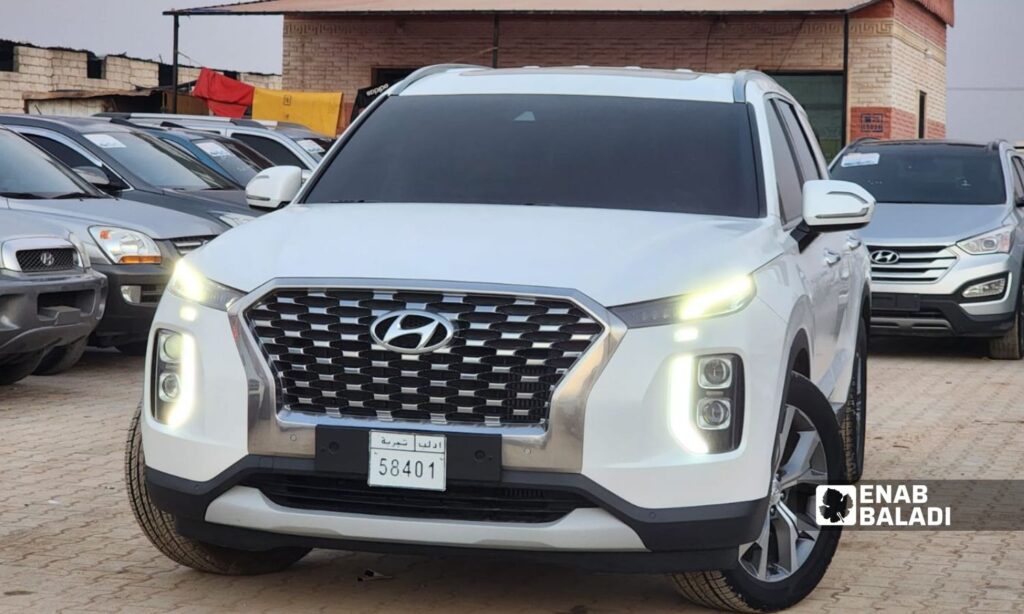Enab Baladi – Anas al-Khouli
Luxurious and modern European cars have taken over the markets of northern Syria, boasting recent manufacturing years and high prices, such as “Range Rover”, “Mercedes”, “Lamborghini”, “GMC”, “Land Cruiser”, “Audi”, “BMW”, and others, now a common presence on the roads and in the showrooms of the region.
The car markets in Idlib display used European cars that traders import from several countries after Turkey allowed their entry into northwest Syria through the Bab al-Hawa border crossing, with the condition that these cars were manufactured at least ten years ago.
The sighting of modern cars is not limited to reality; they are also frequently showcased on social media accompanied by music or words that convey pride and opulence.
Abdullah Osman, the sales manager at al-Yaman car trading company, explained to Enab Baladi that the pictures of cars, especially modern ones, circulated by citizens on social media, are vehicles purchased for personal use by citizens during their travels to one of the countries, or through one of their friends in those countries, and not for commercial display.
Osman added that the role of car companies is limited to helping the car owner with importing it from the current country and bringing it into northwest Syria, due to the merchants’ expertise in transportation and owning the permits to import and enter cars through the Bab al-Hawa crossing.
Ten-year-old models
The car trade in Idlib went through several phases. Initially, car traders imported cars as separate parts, presented as car spare parts from the country of origin, reaching Syria through the Tartus port. After entering northwest Syria, the car was assembled and sold.
After 2019, Turkey allowed car traders to import used European cars, letting them into northwest Syria on the condition that the cars were manufactured no less than ten years ago.
Cars produced after this date require a special permission to enter through the Turkish territory to Idlib.
Modern car models, Searching for “the sought after”
Today, there are modern car models in Idlib’s markets from the current or previous year, priced up to 30,000 US dollars despite Turkey not allowing these cars’ entry.
The exchange rate of the Turkish lira circulated in the area against one US dollar is 31.1 for selling and 31.5 for buying, according to the pricing of the Currency Exchange Union in Idlib adopted in the region, while one dollar equals 14,650 Syrian pounds.
Obaida Hammadi, owner of al-Taftanazi car trade showroom, told Enab Baladi that he imported a “Hyundai Palisade 2023” model as an experiment a year ago and sold it for 40,000 US dollars.
After the financially capable citizens showed interest in modern cars, traders imported several of them, such as “Mercedes, Range Rover, and Kia Mohave”, all of which were 2020 models and beyond.
The average prices of these cars reach 30,000 US dollars according to Hammadi, pointing out that some citizens are interested in buying cars with advanced unbeatable technologies (the sought after) cars, according to their available financial resources.
Two routes for entering the north
Osama al-Raslan, a partner in al-Rashed and al-Raslan car trading company in Sarmada, told Enab Baladi that the citizens’ demand for modern cars increased during 2023, despite their high prices, encouraging traders to import more of them despite the general market slowdown.
Al-Raslan added that traders in the northern region import modern cars in two ways: either through Turkey, where the customs broker pays a financial penalty after the car’s arrival at the Mersin port, then bringing the car in through the Bab al-Hawa crossing to Idlib.
The second method, which traders resort to when it is not possible to bring the cars through the Bab al-Hawa crossing, is by transporting the car to Iraq, then to Erbil, and finally to northwest Syria across the eastern regions controlled by the Autonomous Administration of North and East Syria (AANES).
Electric cars
After the availability of electricity in Idlib, some merchants believed it was possible to display electric cars and market them, in an attempt to change the car trade pattern and move towards selling electric cars, working on establishing infrastructure for these vehicles.
Fuad Al-Raslan, another partner in al-Rashed and al-Raslan car trading company, told Enab Baladi that one of the traders bought four electric cars of the 2014 model, as allowed by Turkey, and imported them through al-Raslan company into the region, pointing out that his company’s role was confined to transferring the cars from the country of origin to northern Syria.
According to al-Raslan, the electric cars were sold for 30,000 US dollars, considered fitting and appropriate in comparison with their specifications and advanced technologies.
He clarified that electric cars did not find popularity in Idlib due to their high prices, making them affordable to only a very small segment of citizens, in addition to the lack of infrastructure for them, such as fueling stations and maintenance centers with the necessary expertise.
The daily labor wage ranges from 70 to 100 Turkish liras (three dollars) depending on the profession and the number of working hours, while northwest Syria is home to 4.5 million people, 4.1 million of them need assistance, and 3.3 million suffer from food insecurity, 2.9 million of them are internally displaced, and two million live in camps, according to the United Nations, whereas local statistics speak of 5.5 to 6 million people.

